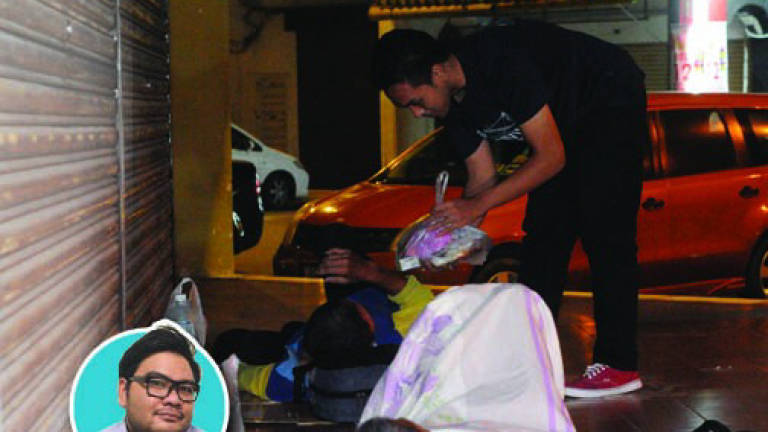Break the cycle of poverty

OVER the weekend, news broke of a disabled man and his family living out of their car after being evicted from their rented home. The Johor family of nine now live in a car parked at rest areas, while both parents are working for what I can only hope is a minimum wage.
Also mentioned in the news report was that a non-governmental organisation has stepped in to help the parents and their seven children. However, Malaysia has a bigger problem that we seem not to be discussing, and that is: what do we consider as basic needs for all Malaysians?
For myself, I believe in providing the basics to everyone, regardless of their race, religion, gender, and the number of dependants they support.
And what are those basics?
We are slowly providing them on a charitable basis as is – food, water, shelter and healthcare. All of these are available one way or another through NGOs or even through our state religious welfare organisations and the federal welfare department.
That being said, there is a need to point out the obvious – most of these are available in Kuala Lumpur, but we cannot say the same for every state in Malaysia. Case in point, the evicted family in Johor. However, this family's plight raises the need to push the point further – government should strive to provide all the basic needs and keep them within reach of all Malaysians. When it comes to food and drink, is everyone able to afford it on the minimum wage, while also maintaining shelter and the necessary utilities?
If they are unable to do so, such as this handicapped husband and his wife with seven children, who can they turn to for aid? One would think that those officially on the handicap list would be automatically referred to the welfare department for a check on aid, but it seems that we don't have such pro-activity in any form.
Thus the problem is agencies and departments handling welfare are not pro active and seem to be in silos. One agency does not know what the other is doing. Thus, you could register for federal welfare, but you won't be automatically registered for the state welfare plan, or the state zakat department, or even the BR1M programme.
Instead, the poor asking for aid would have to apply for one after another, and that would only be if they were lucky enough to be informed that such aid programmes exist.
The poor do not have access to television, the internet, the radio, perhaps they do not even have the luxury to sit down and pay attention to such advertisements surrounding them. Thus, government proactivity, intervention and interaction on both state and national levels is paramount.
It is the same with the next level of needs for the poor and extended to the middle class – access to job opportunities and public transport. In fact, shouldn't the former be combined with the ability to register for aid?
Again, just a reminder – many poor people don't have access to the internet and might not have the luxury of media exposure. Thus, it is imperative to have physical brick and mortar establishments that will allow them access to job opportunities and welfare registration as well as providing guidance and counselling in both urban and rural areas.
Perhaps place these in every urban and rural transformation centre, and ask police personnel to advise the homeless and poverty stricken where they go to for help.
Yes, there are many problems when it comes to breaking the cycle of poverty. For a start, all of us need to be mindful of one another and that includes us knowing our neighbours and referring their predicament to the relevant agency.
Sure, post it as a sob story on social media to highlight the plight of poor people who have slipped through the welfare net if you can't control yourself, but end it on a happy note by actually knowing you did your part in helping alleviate the problem, rather than just ranting.
The cycle of poverty needs to be broken by spreading information, making it easier to register for aid, and for us to all be informed and inform others who might need it as badly as the family of nine living out of a car in Johor. And that is where we should all play a role.
Hafidz Baharom is a public relations practitioner. Comments: letters@thesundaily.com